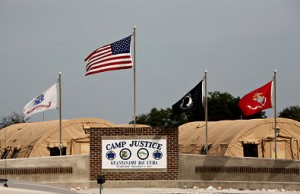
Image provided by Fred Conrad/The NYT
An interesting op-ed in the New York Times surrounds the dissent between Brig. Gen. Mark Martins and the Obama Administration concerning the charges being brought against the detainees in Guantanamo Bay who are charged with terrorism related crimes. In October 2012, the United States Appeals Court for the District of Columbia vacated a military tribunals verdict against a member of Al-Qaeda because his offense of “material support for terrorism” was not recognized as a war crime under international law. That verdict now casts a large shadow on other cases with crimes not recognized under international law; most notably, the crime of “conspiracy.” The article notes that during the Civil War and War World II, the crime of conspiracy was charged but those examples are very different from the politics and backlash the United States faces today on an international scale.
Gen. Martins wishes to scale back the charges that are triable by the military commissions and focus on charges that are internationally recognized such as crimes directed at harming non-military i.e. civil targets. Since many of the detainees are being held based on charges such as “providing material support for terrorism” and “conspiracy,” charges that have no links to specific attacks, it would lead to indefinite detention versus trials because there would be nothing to charge them with under international law. Obviously, the United States would not just release these men as it would have to if the defendant was a U.S. citizen. Indefinite detention would clearly bring backlash on the United States, more than it already has on this subject.
One of the men quoted in the article raised an interesting parallel: What if Iran shot down an America pilot and then the Iranian military charged him with a crime that came from Persian tradition rather than international law? Would Iran be able to cite America’s precedent concerning these detainees? It is a scary thought and perhaps one the Justice Dept. needs to consider going forward.
I personally feel this is more of an example of international law not being able to keep up with the changing face of warfare. Terrorism has no legitimate face or national identity. It is going to be harder and harder to fit current crimes to the actions people are taking to support terrorism.
Should the Obama administration listen to Gen. Martins and charge the detainees with what is recognized under international law rather than what the Justice Dept. calls the “American common law of war”?
Article Source: The New York Times
This is a difficult question; on one hand, I believe that we should punish someone who committed a crime against our country. On the other hand, it is important to respect international law. If there is no international crime with which to charge the person, then simply keeping him locked up indefinitely seems wrong and will most likely lead to an international backlash against the United States. However, releasing the person must be out of the question, purely from a national security standpoint. If the person has acted against the US before, he will do it again. Therefore, I believe we should charge him with domestic crimes, especially if he committed the act while on American soil. That seems like a no brainer to me; if he acted against our country, while being in our country, he should be charged with one of our country’s crimes. The problem with this logic is if he is caught acting against the US while in another country. Then it would be more difficult to justify charging the person with a US crime instead of a crime that is recognized under international law.